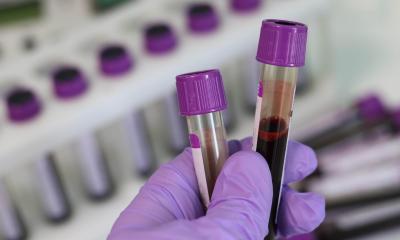
© Felipe Caparrós – stock.adobe.com
News • Promising diagnostic tool
Alzheimer's: New test to detect side effect risk from drugs
At the ADLM 2024 (formerly the AACC Annual Scientific Meeting & Clinical Lab Expo), researchers presented data on a novel test that predicts whether Alzheimer’s patients are genetically predisposed to side effects from anti-amyloid drugs, a promising new class of Alzheimer’s therapeutics.
The test could improve outcomes for patients with Alzheimer’s by helping to prevent instances of brain swelling or bleeding caused by these drugs.
Just last year, the anti-amyloid drug lecanemab became the first medication ever to receive Food and Drug Administration (FDA) approval for slowing the progression of Alzheimer’s. More anti-amyloid drugs have received FDA approval since then, offering much-needed hope to individuals with this condition. At the same time, however, concerns have been raised about the safety of these drugs, with the FDA warning that they can cause brain swelling and/or bleeding. This side effect is known as amyloid-related imaging abnormalities (ARIA), and while it’s usually mild, in rare cases, it can lead to death. The risk of ARIA is elevated in those who have particular variants of the gene APOE, which is implicated in many forms of Alzheimer’s. The FDA therefore also recommends that patients undergo genetic testing before taking anti-amyloid drugs.
There’s been a lot of progress with new [anti-amyloid] drugs approved by the FDA, and as a consequence, diagnostic assays need to be updated to be able to test for the consequences of these drugs
Maite Sabalza
A team of researchers from the medical diagnostics company Revvity's Euroimmun has developed a new PCR-based test that determines if a patient has a high-risk combination of APOE variants (also known as a genotype). This method tests for all six possible APOE genotypes simultaneously, which allows for quicker processing by laboratories and ensures that patients receive results faster. To evaluate the test’s performance, the researchers used it to analyze 100 blood samples from Alzheimer’s patients and 10 samples from healthy blood donors. The researchers also analyzed the same samples using a CE-IVD-marked APOE test and a method known as bidirectional Sanger sequencing, then compared the results from all three methods. All the results agreed in 110 out of 110 cases, showing that the Revvity's Euroimmun test detects a patient’s APOE genotype with 100% accuracy.
“There’s been a lot of progress with new [anti-amyloid] drugs approved by the FDA, and as a consequence, diagnostic assays need to be updated to be able to test for the consequences of these drugs,” said Dr. Maite Sabalza, senior scientific affairs manager at Revvity's Euroimmun. “There is a need to screen patients before receiving treatment, and if they are [positive for a high-risk APOE genotype], doctors can discuss the possibility of stopping or monitoring the treatment or trying something different.”
The team at Revvity's Euroimmun is hopeful that their test will become part of the care Alzheimer’s patients receive before taking these drugs.
Source: Association for Diagnostics & Laboratory Medicine
05.08.2024





